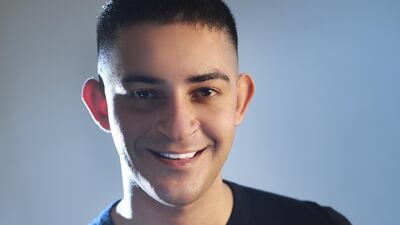The subjects of refugees and human trafficking can make for harrowing novels, but Chaker Khazaal infuses his work with enough tenderness to render them hopeful and at best, a rallying call for change.
Indeed, the young Palestinian- Canadian author, who will make an appearance at the Emirates Airline Festival of Literature in Dubai on Friday night, has found success with a set of stories that blends fact and fiction and war and love.
His latest novel is a case in point: Tale of Tala follows an American writer who travels to Europe all the while mourning the loss of his mother. There, he meets and falls in love with the Palestinian refugee Tala, who beseeches him to find her Turkish husband Bilal, who was kidnapped by human traffickers.
The novel marks a departure for the 30-year-old – it is his first stand-alone novel after completing The Confessions of a War Child trilogy featuring love and adventure set among the wreckage of war.
With all of his books selling out on their initial print runs, not to mention the launch of Tale of Tala at the British Parliament last year, Khazaal puts the positive response down to people's need for a good story. "I think people have just become desensitised to stories of war and facts and numbers in ways that's not engaging to the audience," he says. "So when you present these tales in the form of a love story, it will have a deeper effect because everyone can fall in love, whether you are in the United States, Europe or Syria. So this way it makes it easier to reach your target."
For Khazaal, raising awareness is more important than becoming a successful author. He describes the novels as a mere platform to humanise and shed light on the plight of refugees. "I don't see the line between being a writer and advocacy," he says. "I am just using stories as a way to get the message heard." It's understandably a deeply personal mission considering Khazaal's background. Born as a Palestinian refugee in Bourj el-Barajneh camp in southern Beirut during the civil war in Lebanon – a one-kilometre-square area home to 20,000 people – Khazaal recalls childhood pains being given reprieve through the stories told by the camp's elders. "Palestinians who left Palestine in 1948 left with nothing except memories and stories," he says.
"These were their only reminders, and they made sure to pass them down to younger generations. It was very common in the camp to see a grandma tell her grandchildren stories about the homeland and life in those cities," he recalls. Another aspect of the camp life Khazaal revelled in was the ability to express himself through local theatre plays and later going to star in the Palestinian film Sugar of Jafar as a 12-year-old.
After a string of failed applications, Khazaal managed to flee the refugee camp to Canada on the back of an education scholarship. With Toronto as his base, he launched into a seemingly endless array of humanitarian initiatives; from starting a non-profit programme providing refugees with work in e-marketing, social media and web development, to working with Jordan's Palestinian refugees to design traditional scarfs. While such programmes – which he is still involved in – are helpful, Khazaal's novels may prove to be the most influential, in that they are read by a steady stream of teenagers and young adults who are well placed to challenge misconceptions surrounding refugees.
Through his work with the United Nations High Commissioner for Refugees, Khazaal also has the opportunity to visit international refugee camps and hear the stories of survivors whose anecdotes end up in his books. This raises the question: is Khazaal sensitive to the idea that his work – if not handled sensitively – could come off as manipulative?
While conceding that there is a fine line, the author says his personal experience – not to mention his eagle-eyed book editor – protects him from falling into such a trap. "By growing up in the camps and knowing what it feels to be displaced, I am familiar with that fine line," he says. "I remember that thousands of reporters would come to the camp and take pictures and that can fall into this idea of 'humanitarian porn' that we are now talking about. Now if you ask me where that line is, I can honestly say that it is hard to describe and that's how many people fail when they are telling the story.
"Since I have been on both sides – from being the subject of the story and now the one writing it, I think you just know if it works," he says.
Chaker Khazaal appears on the Friday panel session Expat, Migrant Refugee at 6pm. All Emirates Airline Festival of Literature events are held at the InterContinental Dubai Festival City. For more information, visit www.emirateslitfest.com
____________________
Read more:
Syrian author Khaled Khalifa on Aleppo: 'There is a resilience in the city'
Emirates Airline Festival of Literature announces full line-up
International Prize for Arabic Fiction: The six finalists shortlisted for the 'Arabic Booker'
____________________


